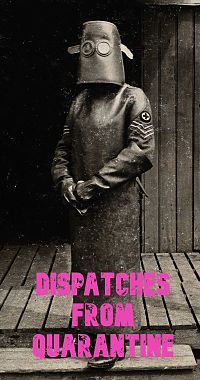 I am struggling with what to write about these days.
I am struggling with what to write about these days.
My husband and I are currently a long way from our home in Queens. We are in Minneapolis, where the Guthrie has graciously allowed us to stay in artist housing—even though my show there, the planned world premiere of my adaptation of Emma, has been indefinitely postponed.
I was in rehearsals for Emma when Broadway closed—and then Off-Broadway, and then regional theatres, shutting down one by one, almost unbelievably fast. We were doing table work as the announcements started to roll in, but I can’t say my focus was at its keenest: My phone was filling with anguished texts from friends who had watched months of work evaporate in 48-72 hours. We are people who imagine things for a living, and yet none of us had really foreseen our industry folding up so quickly, health insurance weeks disappearing, incomes stopping short, and many institutions left in existential danger.
For a few days, Emma kept rehearsing, the company ashen-faced and distracted and trying to make a comedy. It was surreal to keep going; it felt like being in a lifeboat paddling away from the Titanic. By the time we learned that the show, like everyone else’s, was cancelled, my husband was already flying out from his “clopening” of Amadeus at Syracuse Stage.
He arrived and we went straight into isolation. We’ve been in isolation for 25-plus days. We eat too much. We watch too much television. I spend too much time on social media. We’ve lost all of our stage work up until July, at least—four plays postponed or cancelled for me, two acting gigs lost for him. But we feel very fortunate to be safe and to be together. And we know, first and foremost, that these decisions were 100 percent the right ones—that the cancellation of work is nothing if it saves lives.
People say, “This must be a great time to write!” In a way, it’s true—there’s never been more free time. But I struggle with making a start.
I keep a journal of what is happening every day, for posterity and for theoretical inspiration. By far my longest entry, thus far, was detailing the byzantine process I take to procure and sanitize groceries. It turns out I am very good at being neurotic about contamination. My OCD—a neurological tic that has given me untold grief over the years—has finally paid off. Nature built my anxious attention to detail for this time. If tigers are God’s perfect killing machine, I am God’s perfect worrying machine.

But there are only so many hours one can devote to obsessing about virus stability in cardboard; I have to try to write something real, and not because of any outside pressure to be productive. Like most theatre people, I am a workaholic, and without active projects, I am a bit like a Border Collie without sheep. If I don’t have substantial, challenging work to do, I fear I will start gnawing the legs off of the furniture.
The problem is that writing plays requires the kind of reflection and remove that allows for storytelling. Every morning I wake up and read the news, full of pain and death and encroaching fascism. Many of my loved ones are out of work. My sister-in-law works in a COVID ICU, where she faces long shifts full of unimaginable choices every day; she is a warrior with three young children at home. My mother is confined to her room in assisted living for an indefinite amount of time, since there was a case within her community; visitors are (understandably) barred; she is lonely and sad. She can’t hear well, and her captioned phone is not working. She says, “I’ve never gone so long without seeing you kids, since you were born.” She says, “I am trying to be strong and stay cheerful, but it’s so hard.” She can’t hear anything I say in return.
It’s hard to find reflection and remove from all that, and on my worst days I stay in pajamas and drown in worry and struggle with the idea of making anything that might mean something. Every word feels pat and trite, either too doomsday or too Pollyanna. I’ve always had trouble with motivating for myself—I do much better with obligations to other people, with external deadlines, with striving toward a common goal. And so my only luck thus far is thinking of individual work as part of a much greater task.
I am not afraid that theatre won’t come back. Theatre has survived plagues and wars and the death of entire civilizations before. Its end is always being forecast, and the tough, flashy old broad always persists. We, as artists and institutions, are facing heartbreaking existential threats, but coming back from disaster is, in a sense, a painful part of our artistic legacy. Sophocles and Shakespeare both created masterpieces after illness decimated their societies; we will too. They—and all artists who have withstood calamities—are our forebears in creating under duress.
The virus and its shockwaves will eventually pass, and then people will need to be in rooms together. Our communities will need catharsis more than ever. We will all need healing, and we will need in-person connection. One of the things I love about theatre is that it makes life endurable by giving it shape. We can foster strength and healing. We can try to make sense of the senseless.
But while I’m not afraid that theatre will die, I am quite afraid that the existential struggle to survive will cause it to backslide. I’m frightened that our need to make a living again will cause the industry to flee back to the perceived “safety” of toxic leadership and “conventional” stories. I’m scared that the slow but necessary work of combating #MeToo in theatre will be overlooked in a desperate attempt to return to any status quo. This calamity happened just after a huge national shift occurred in artistic leadership. More women and leaders of color were given the steering wheel than ever before, and many embraced new, healthier models of management. Will those leaders be given time and space and support to right the ship?
Theatre will have to be reborn after the worst of this crisis has passed. It shouldn’t be reborn with the same racism, sexism, and classism issues. We can no longer countenance predators in our field. I don’t mean to rearrange deck chairs on a leaking ship—I understand that survival is first and foremost on the agenda. But we can use this unwelcome pause to plan how we may come back stronger, more resilient, and more equitable than ever before.
Frankly, it is our job, as people who imagine for a living, to think outside of old boundaries. We can’t afford cynicism or backbiting or a pivot to broken structures. A return to “normalcy” is not possible; every foundation of our lives is now shaken. But we may use this painful moment of rebuilding to create positive structural change—we have to try. The old world is gone, and bad old habits will not bring it back. If we have to build a new world, why not try to make it better?
So I am struggling with what to write. I eat too much. I watch too much television. I spend too much time on social media. But I have to find a way to create something—because what other choice do I have? We have to try to reframe this story.
Kate Hamill is among the most-produced playwrights in the U.S. for her adaptations of such classic literary works as Pride and Prejudice, Vanity Fair, Dracula, and Little Women.

